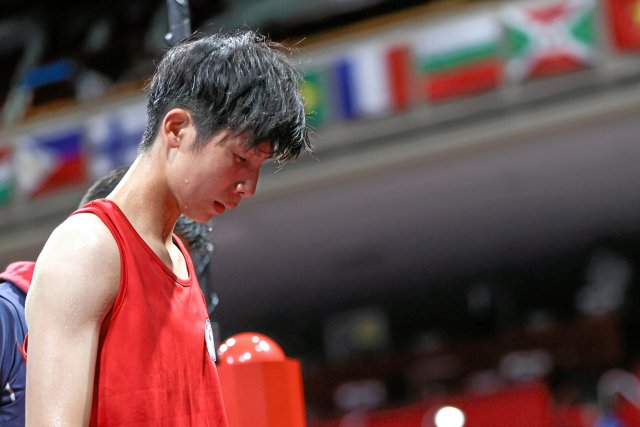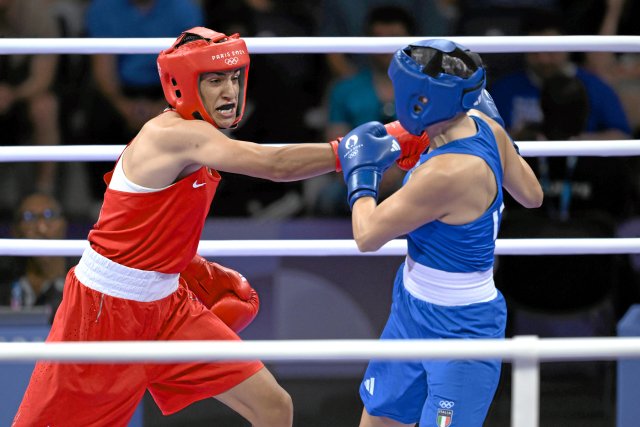Imane Khelif (l.) won her opening fight by giving up the Italian Angela Carini early.
Photo: imago/Joel Carrett
The Olympic Games are always a time of scandals. Often it was about doping, sometimes about displaced homeless people, recently about spying with drones. All of this has already been reported from Paris. The latest – and here it must be added: alleged – scandal is currently making the rounds, particularly in conservative media. Two trans women should be allowed to compete in boxing, even though they failed a gender test a year ago and were disqualified. As usual, the issue of transgender people in sports is not the only reference to alleged injustice. Since it is a martial art, there is immediate danger to the life and limb of the opponents. For example, the online site boxen1.com had the headline: “When wokeness becomes a danger: transgender boxers at the Olympics.”
The problem with the scandal: It may not be one. It is not even clear whether the two athletes Imane Khelif (Algeria) and Lin Yu-ting from Taiwan are even trans women. There are also doubts about the gender test at the 2023 World Cup, and even the increased health risk in this case seems more conjured than real, even if it is certain after Khelif’s opening fight on Thursday in Paris, in which her Italian opponent had to give up after just 46 seconds should be produced again. It’s high time for some clarification.
Incorrect terminology
Even the term transgender seems inappropriate here. The boxing website article mentioned above also says: “The two transgender boxers were born as men, but feel like women – and that’s okay.” So much tolerance sounds laudable. However, the fact that the two were born male remains completely unproven. In fact, there has so far been no evidence of any kind of gender or identity change.
However, transgender is used to describe such changes in identities from woman to man or vice versa, often but not always accompanied by surgical or hormonal treatment to adapt one’s appearance to one’s perceived gender. Neither Khelif nor Lin is known to have had such a change of identity.

Lin Yu-ting
Photo: imago/Ou Dongqu
So why this name? In addition to ignorance, the ominous gender test from 2023 probably comes into play here. Depending on the sources, the chromosome pair XY was detected in one or both of the boxers during a DNA analysis. So man, so cheating, so disqualified. So easy.
Unfortunately it’s not. Since the 1950s, female athletes have been subjected to physical examinations, later chromosome tests and finally hormonal controls. Chromosome testing is no longer used because the XY pair is not clear evidence of maleness. Rather, in rare cases there are so-called XY women who anatomically have the external sexual organs of the female sex, although a Y chromosome is present. Anatomically and hormonally they are female. It is not clear whether this applies to female boxers. Lin, 28, has not commented publicly. According to AFP, Khelif, who is three years younger than her, spoke of a “conspiracy against Algeria” so that the country’s flag would not be hoisted if she won the title. This also sounds strange, but it remains clear: the DNA test is not conclusive.
A shady association
Then why was the test done? The World Cup in Delhi in March 2023 was organized by the International Boxing Association (IBA) and even then it was not under a good star. At that time, most associations still excluded all Russians in the wake of the Russian war of aggression in Ukraine. But the IBA allowed them – at the request of its President Umar Kremlev, a former member of the nationalist motorcycle rockers Night Wolves and a close confidant of Russian President Vladimir Putin. The World Cup was then boycotted by many nations, including Germany.
At that time, the IBA also reintroduced the controversial DNA tests. This too, it can be assumed, was at Kremlin’s request. Transphobic policies have been pursued in Russia for years. The disqualification of Khelif and Lin had the flavor of an example that was intended to be made in the media. A few months later, a law was passed in Kremlev’s homeland banning gender reassignment surgery. The gender entry in the passport can no longer be changed. Trans people were banned from adopting children. Existing marriages were declared invalid. The measures were so serious that the German lesbian and gay association joined a petition calling on the federal government to set up an admission program for trans people from Russia.
The “nd” cannot verify whether the two boxers are trans people, intersex or something completely different. But above all: the International Olympic Committee (IOC) does not seem to be able to do this either. The IOC suspended the IBA many years ago due to various cases of corruption and fraud under Kremlin’s aegis and is organizing the boxing tournament itself. The Rings organization is therefore also responsible for the admission guidelines.
The IOC just follows its rules
As early as 2021, the IOC had issued a guideline recommending that professional associations no longer hold discussions about limit values and instead always decide on a case-by-case basis whether a female athlete, whether trans or intersex, has an advantage or poses a danger to her opponents. If not, a start should be agreed to. Many associations did not adhere to the guidelines, but in boxing the IOC has its own say and allows Khelif and Lin to fight after their own examination: “Every starter meets the conditions of participation. According to their passports, they are women. They have been taking part in competitions for many years and have not suddenly appeared. “They are women,” said IOC spokesman Mark Adams, explaining the decision.
In conservative forums, however, studies are cited that show men hit 162 percent harder than women. It is far too dangerous if the IOC is wrong. But are the Algerian and the Taiwanese really so powerful? A look at her record at major tournaments doesn’t show this: Khelif has only won nine of her 13 fights in the class up to 66 kilograms, of which a referee only ended one prematurely. Her greatest success was World Cup silver in 2022. Lin is already better in the weight class, which is nine kilos lighter: she has 24:2 victories and two world titles. But she only won twice before. There is not a video of a rainfall on the internet.
Angela Carini also didn’t waver on Thursday despite a strong right from Khelif. Rather, the Italian broke off the fight because she felt “severe pain in her nose.” It was a mature decision not to put his health at risk. Afterwards she cried kneeling on the ring floor. However, that only had to do with her father’s death. He died the night before their first fight in Tokyo 2021 and Carini did not compete as a result. After a two-year break, she now attempted an Olympic comeback, which ended too quickly.
When asked about her opponent, the Italian said: “It’s not my place to say what’s right and what’s wrong. I wish her that she makes it to the end of the tournament and can be happy. I don’t judge others.” In Twitter comments you could still read that a man had beaten a woman.
Broken noses during boxing are not uncommon. Such risks of injury are actually priced in. A fighter is rewarded with victory and is not sued for assault if she knocks her opponent unconscious. Men even don’t wear head protection. So why this selective excitement, such as that of Australian boxer Caitlin Parker, who spoke of an “incredible danger”? She didn’t agree with the permission to take off, and “someone should seriously look into that,” she demanded. Apparently she hasn’t followed this advice yet.
